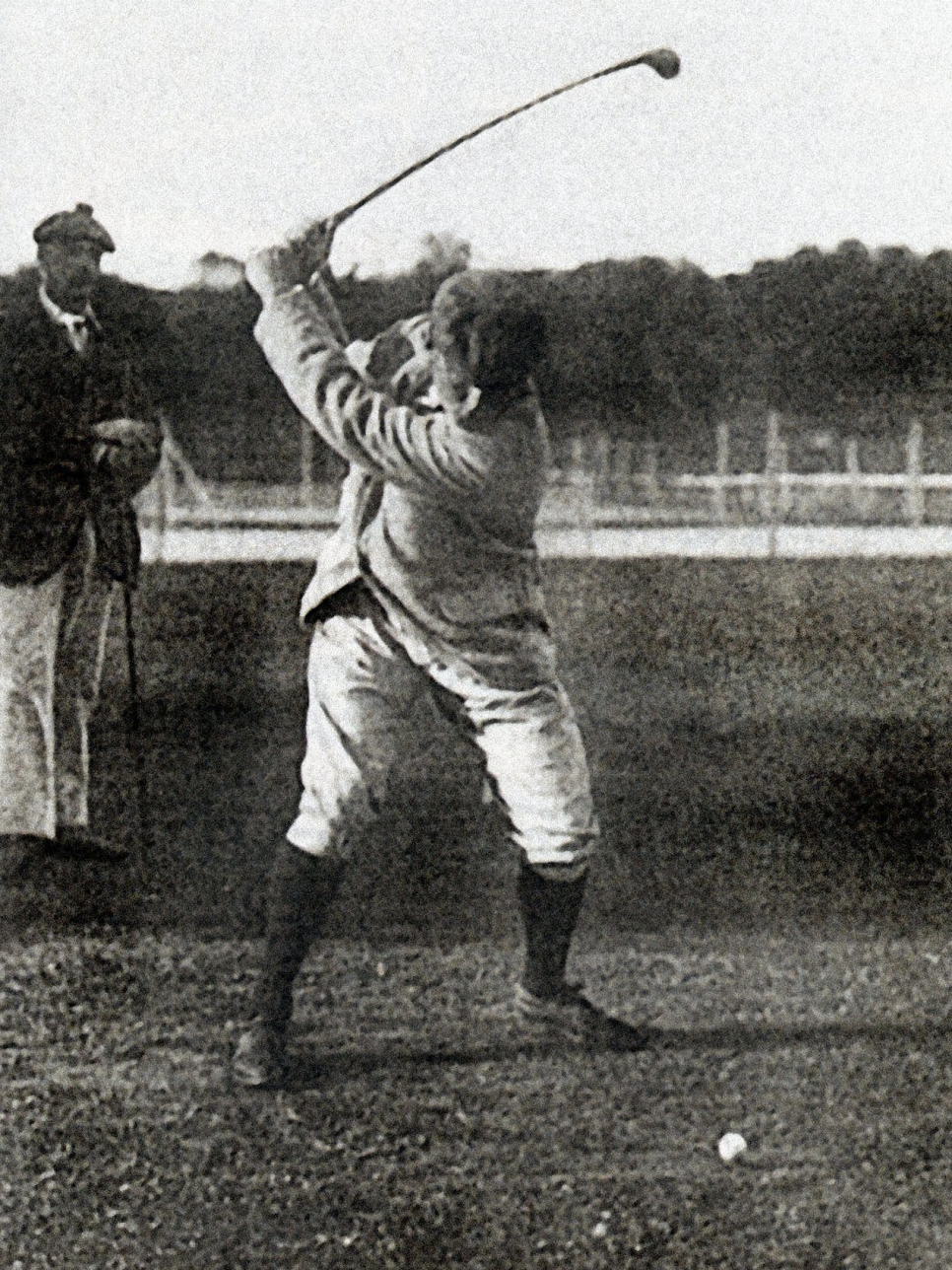[PHOTO: Stephane de Sakutin]
The history of Olympic golf is at least a little bizarre even when you look at just the modern iteration – between the Zika virus that kept some top players away from Rio in 2016 (or at least gave them a good excuse to stay home), and COVID that delayed the Tokyo Games a year and then kept the fans away, things haven’t exactly been normal. But go back in time to when golf was first held at the Olympics, and that’s when things get truly bizarre. It turns out that these Paris Games are actually the second time France has hosted Olympic golf; the first came in 1900, although nobody in the field seems to have known they were competing for history; not then, and not for the rest of their lives.
To begin explaining the strange events of 1900, you have to start a few years earlier with Pierre de Coubertin, the French baron who was essentially the lifeblood of the modern Olympic movement. He was a fitness and sports enthusiast whose relentless energy found an outlet in planning huge sporting events, of which the Olympics were his crowning achievement. Working together with the Greek government, he helped stage the 1896 Games in Athens, the first modern Olympics. Those were a huge success, and the Greeks wanted to hold them every four years, but Coubertin’s vision was to move the games from city to city, and it’s due to his influence that they came to Paris in 1900 for the second staging of the great event.
The big problem for Coubertin, and for Paris writ large, is that there was an international exhibition being staged that was called the Exposition Universelle, and that we now know as the World’s Fair. The Olympics in those early years were not the two-week festival we know today; they lasted for months, and so did the Exposition. Like the Olympics, the Exposition staged various sporting competitions. But while the Olympics were at that time a relatively obscure competition, the World’s Fair was famous, and it was the bad luck of the Olympic organisers that they suddenly found themselves playing second fiddle.
This created a situation where Olympic competitions were held in conjunction with the World’s Fair, but in actual practice, there was no clear delineation between the two, and in many cases, like golf, nobody took real strides to clarify the situation. The athletes competing in many of these events had no idea they were in the so-called Olympics, and many of them would have had no idea what the Olympics were in the first place.
Enter Olympic golf. Today, the IOC recognises a tournament held at the Compiegne Club north of Paris in early October 1900 as the first ever Olympic golf tournament, but as you’ve likely gathered, the tournament’s connection with the Olympics was tenuous and confusing – it appears the organiser was affiliated with Coubertin, but that things were further muddled by the World’s Fair leadership opposing the Olympics and co-opting much of it. At some point in history, the IOC took a backwards glance at certain events held around the 1900 Games and made a retroactive decision to designate them as “official”… or not. Among the games that were equally as affiliated with the Olympics as golf – which is to say, very little or not at all – others did not make the cut, including angling, ballooning, cannon shooting, kite flying, life saving, and pigeon racing. (No, none of those are jokes – they were all very real events held around the 1900 Games, but the IOC never gave them the seal of approval as they did for golf.)

So who was actually at this golf event? The glib answer, but also the correct one, is “mostly rich Americans and Brits who were on vacation”. Through the fog of history, we no longer know how the event was promoted, and the fact that the winners received a porcelain bowl instead of a medal further blurs the lines, though this wasn’t uncommon at the 1900 Games. Regardless, the reality on the ground is that most of the competitors probably had only a vague idea of any broader affiliation, and just understood that the mayor of Compiegne had organised a golf tournament that might be worth playing.
As part of the tournament, there was a men’s event, a women’s event, a handicapped event, and a putting competition – the latter two are not counted by the IOC as official. Twelve men played a one-day, 36-hole event, and the winner was an American named Charles Sands, who was known primarily as a court tennis player, and who had only taken up golf five years earlier (but found instant success, making the finals of the first US Amateur event three months into learning the game). He was in Paris to compete in tennis, but the golf was apparently a nice diversion, and he shot 82-85 to beat Scotland’s Walter Rutherford for first place. (The bronze medal went to David Robertson, who played out of Troon and had competed for Scotland in the 1896 Athens Games in rugby.)
The women’s tournament featured 10 competitors, including Chicago’s Margaret Abbott, who was in Paris to study art, and her mother Mary Abbott – the only time a mother and daughter have competed at the same Olympics, much less in the same event. Margaret Abbott shot a 47 to win – defeating a relative of the American poet John Greenleaf Whittier (silver medal) and a future princess of Serbia (bronze medal) along the way, then went about her life as a wealthy socialite. Long after she passed away in 1955, a researcher from the University of Florida named Paula Welch did some research into this first Olympic tournament, and when she had gathered enough information, she called Abbott’s son. When she told him that his mother was the first Olympic gold medallist in golf, and by turn the first woman to win a gold medal in an individual event, he was stunned – he had never heard anything about it, which makes it a virtual certainty that Margaret Abbott herself lived and died without ever knowing what she’d accomplished.
As mentioned, the handicapped event wasn’t counted as an official Olympic competition, but the winner of it was still important – the winner was an American on a business trip named Albert Lambert, who founded the company that made Listerine, and for whom Lambert International Airport in St Louis is named. Buoyed by the experience, and with the help of his father-in-law, he’s the one who brought Olympic golf to St Louis for the 1904 Games, which was the last time golf would be held until its return more than a century later in Rio. And that St Louis event, it may not shock you to know, was somehow even weirder. So just know that whatever happens this weekend at Le Golf National as the men compete for gold, it would take something really baffling to match the wonderful absurdity of the first time France tried Olympic golf, 124 years ago.
The bizarre story of the Canadian who held off more than 70 Americans to win golf’s first gold medal

